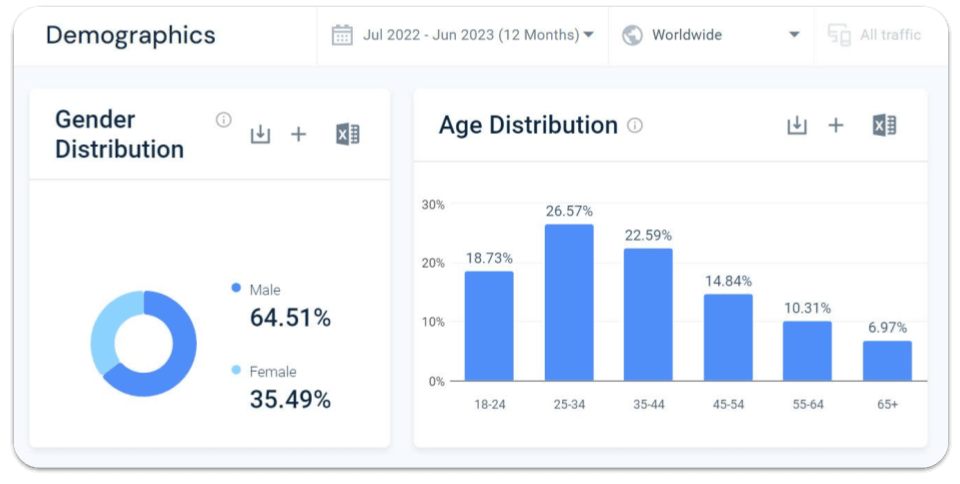Bing SEO: Higher Optimization Awaits

SEO takes on a major role in the world of digital marketing.
When we think of SEO, for obvious reasons, we focus almost entirely on Google. For those of you who might have forgotten – Google isn’t the only search engine out there.
If you look at the Market Leaders report in the Similarweb Web Market Leaders, you’ll see that Bing gets 1.246 billion visits per month.
This means Bing can potentially bring substantial targeted traffic to your site.
Not convinced yet?
According to ComScore, traffic converts better at Bing’s Network and their audience spends 6.8% more money online than Google searchers.
No matter where your loyalty lies, through this blog post we’ll get deeper into the advantages of Bing SEO.
Before we get into the SEO aspect, let’s get properly acquainted with Bing and what it can do for your online business.
What You Should Know About Bing
Since its launch in 1998, Bing successfully controls around 1.97% search market. Although the search engine mainly markets across the US and other English-speaking countries, it has a sizable audience in China.
This brings us to the question – who uses Bing?
Let’s start with demographics.
As you can see the Bing audience is 64.51% male. What’s more, the audience tends to be primarily from 25 – 34.
What’s more…
Additionally, Yahoo is powered by Bing, so if you take up the challenge to optimize for Bing, you’ll be killing two birds with one stone.
This brings us to the platform SEO, and if you know anything about Google optimization, doing the same on Bing will be a breeze.
In fact, all you have to do is keep in mind the slight differences between the two and you’re ready to go.
Let’s go through the key SEO aspects Bing provides.
The Ins and Outs of Bing SEO
The best part of optimizing on Bing is, unlike Google, Bing is an open book when it comes to sharing its SEO requirements. So, instead of playing a guessing game, SEOs are fully aware where they need to put in more effort.
For those who don’t want to lose any time away from Google optimization, the good news is that you won’t.
While optimizing for Bing, you’ll be, in some way, optimizing for Google as well. All you need to do to achieve that is set your priorities before you turn over a new leaf.
Bing Webmaster Tools
The first step towards increasing your site traffic is using Bing Webmaster Tools.
This webmaster area allows you to analyze your search performance through several key entities:
- Backlinks
- Keyword Research
- SEO Report
- Site Audit
By properly using Bing Webmaster Tools, you’ll be able to see the exact amount of clicks your page gets from its search engine. These aside, you can also get insights on the top keywords from organic searches your site ranks for.
Similarly, you’ll get insights on domains, referring pages, and anchor texts.
And, the site-scan feature crawls your site, analyzing it for common technical SEO issues.
Bing Webmaster Tool is truly incredible and can help you with many of your SEO efforts.
Once you have an overview of your SEO position, let’s move forward and go local.
Local Optimization
Local optimization is important for the overall SEO outcome.
Bing Places delivers local search results to its users, so listing your business on the platform should be a priority, especially if you want to be ahead of the game.
For Bing Places, reviews play a big role in terms of your business getting noticed. It’s worth mentioning that the platform displays reviews from third-party sites as well.
Using Bing Places is an effective start to amping up your SEO.
Content is King
When I say content matters, I mean unique, authoritative, and meaningful content.
Duplicating your content won’t do you any favors with SEO, and if you’re throwing in too many ads that are consistently redirecting people – successful indexing on Bing will be a farfetched concept.
Make sure that the content you’re putting out is of great value and engages the readers. When citing, ensure to mention the source and author, thus bringing more authority and trust into the content.
Structure and format are other things you should pay attention to. The ideal blog post length is around 2000 words – enough for you to introduce much-needed flair fit for a superb SEO piece.
The efforts don’t stop here, so let’s move on to further optimization and using backlinks.
Backlinks
When it comes to linking, it is quite similar to content creation – quality is crucial.
You might be in trouble if your site has links coming from irrelevant or spam websites, and the same applies to paid links.
Instead of these two, emphasize anchor text enriched with densely set keywords.
Bing also appreciates having an extensive amount of links – as long as they come from trustworthy websites.
That brings up the question – which websites are authoritative for Bing?
Links from sites labeled as organic, such as .edu, .org, and .gov domains will help your site index better. Additionally, getting your links on older websites is an effective strategy because Bings reads the domain’s age both as trustworthy and authoritative.
Finally, driving traffic from social media promotion is significant for Bing SEO, but before we dive deeper into it, let’s pay attention to another major factor – on-page SEO.
On-Page SEO
The most important thing you should know about Bing SEO is that it reads and prioritizes content with exact keyword matching in:
- Titles of pages; keep it 60 characters max
- Meta descriptions; keep it 150 characters max
- Web content
Another aspect that can help your on-page SEO is using keywords in headings, subheadings, URL slugs, and in the first paragraph of the content.
Furthermore, you should be aware that Bing also prioritizes domains with the exact keyword match. This doesn’t mean that you should change or adapt your domain based on this fact, but keep it in mind for more thorough SEO projects.
The Influence of Social Media
Bing has been open on the importance of social media linking when it comes to its SEO.
The search engine will index websites with social media links that drive valuable traffic. The same rules apply to social media, whose links Bing finds authoritative and trustworthy.
Another point in your SEO to-do list should be earning likes, shares, and tweets, especially if you want your site to move up a page.
No worries, this strategy isn’t as time-consuming as you think.
Today, there is an endless spectrum of tools that listen and help you find relevant conversations connected to your business. Always remember that your social presence should align with your target audience. For this reason, ensure your social media profiles reach the right audience.
Finally, it is wise you produce meaningful content for your social media as well – otherwise, irrelevant content won’t provide you with the desired results.
Mobile Optimization
According to WebFX, people spend 70% of their time on their smartphones, whilst 52.2% of all website traffic is generated from mobile phones.
Therefore, adapting your site and making it mobile-friendly plays a vital role in Bing SEO.
The search engine can read whether your site is open for mobile users, but it’s of utmost importance to avoid mobile-specific URLs. Instead, you can use the same URL for both desktop and mobile apps.
The Power of Understanding Entity SEO
Today, visual search is booming, especially in the SEO game.
No doubt, Bing is the leader in visual search with its entity understanding.
The search engine can understand what your search is about and shows you images based on that. To top it all off, Bing uses high-quality images as part of its algorithm.
Aside from images, the search engine can accurately crawl audio, videos, and Flash websites. It isn’t advisable to go with just Flash websites though but focus on the quality of your remaining multimedia content instead.
With that being said, adding quality content can help immensely in boosting your site’s rating and relevance.
Why Bing?
Most websites optimize with Google in mind and completely neglect other search engines. This means with little to no real effort you can have a steady flow of traffic from Bing as it’s simply not competitive.
And with search engines in general if you understand SERP analysis you can easily find engaged buyers by targeting commercial intent queries. The same is true for Bing with the advantage of substantially lower competition.
Of course, we cannot ignore the fact that the typical Bing user is more likely to increase your traffic and give more value to your site.
Time-wise, it won’t take you much to reach solid optimization. You’ll easily win because of Bing’s policies and open conversations about SEO requirements.
While optimizing for Google is important, as is its aim, Bing grants opportunities for all business models online – and with far less fuss than its competitors.
FAQs
What is the difference between Google SEO and Bing SEO?
Google SEO and Bing SEO are similar in many ways, but they differ in ranking algorithms and preferences for certain factors. Google emphasizes backlinks and fresh content, while Bing values social media signals and page load speed. SEOs should consider these variations when optimizing for each search engine.
How much traffic does Bing get compared to Google?
Google’s market share is around 92%, while Bing holds the second position with approximately 2% of the global search market. This significant difference in traffic highlights Google’s overwhelming popularity and dominance as the leading search engine. But, despite having a smaller share, Bing’s user base is still substantial, making it a relevant platform for businesses to consider when optimizing their online presence.
Why should I focus on Bing SEO?
Focusing on Bing SEO offers advantages over Google such as lower competition providing potential for easier easy wins on the search engine. What’s more, Bing’s audience may differ from Google’s, making it a valuable platform to target a distinct user base and to expand your reach. Moreover, Bing’s strong emphasis on social media signals benefits websites with a robust social media presence, enhancing their rankings on the search engine.
The #1 keyword research tool
Give it a try or talk to our marketing team — don’t worry, it’s free!











![How To Create A High Impact SEO Strategy [+Free Checklist]](https://www.similarweb.com/blog/wp-content/uploads/2024/12/Complete-Guide-to-Creating-a-High-Impact-SEO-Strategy-768x456.png)

